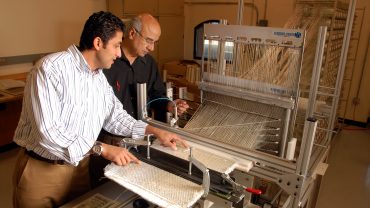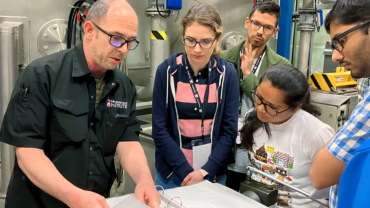Textile Chemistry
The Master of Science in Textile Chemistry (TC) degree program emphasizes the fundamental principles of polymer science, dyeing and finishing technology, color science, dye chemistry, and fiber formation. The program is highly relevant to many of the chemical, retail and textile industries, as well as environmental, medical and forensic science. Taught by the same faculty as the highly regarded on-campus program, the Online Master of Science in Textile Chemistry provides the same level of challenge and benefit as the in-person program.
The Master of Science in Textiles (M.S.) prepares students for industry positions. Students interested in a PhD in TTM or FPS, who do not have a directly relevant undergraduate degree, are encouraged to pursue the MS in Textiles or TC degree. The online M.S. degree is a non-thesis degree and requires a minimum of 32 hours including two semesters of independent study and typically takes three semesters as a full-time student to complete.
A growing number of off-campus professionals from around the world have shown interest in studying for a Master of Science in Textile Chemistry online. Graduates of Textile Chemistry are recruited by a broad range of companies, such as DuPont, Procter & Gamble, Nike, General Motors, fiber and textile companies all over the globe, and state and federal agencies involved with forensic science, among others.
Eligibility
Candidates with a bachelor's degree in textiles, or in a related area, may apply to the master's program.
Plan of Study
Students are held to the same requirements as the on-campus M.S. in Textile Chemistry (Option B), and must follow the rules outlined in the Graduate School Administrative Handbook. In order to obtain a MS TE degree under Option B, students must take a minimum of 32 credit hours, including 2 semesters (6 credit hours) of independent study, TE 630, to the satisfaction of the student’s advisor. Generally, research and thesis preparation courses (TC/TE 695, 699), which may be used in the MS Option A (thesis-based) track, may not be used to fulfill the course work requirements for the MS Option B degree. An exception is made for MS students on the way to a PhD degree. These individuals may count 6 hours of thesis research toward their degree. Students enrolled in this program option will develop a Plan of Graduate Work under the direction of his/her faculty advisor. Students in the Option B programs are not eligible for research assistantships.
MS TE Option B (Non-Thesis Degree) Program Requirements
Students must take a minimum of 32 credit hours to fulfill the degree requirements including:
- A minimum of 24 credit hours are required that meet the criteria from items 1-3 below.
- Students must take a minimum of 12 credit hours of courses with substantial *chemistry* content at the 500 level or above, which includes any course with the prefix of TC (PCC) or CH, or those from the table given below. Other chemistry-based courses must be approved, in advance and in writing (or in the Plan of Work), by the TECS Director of Graduate Programs.
- Students must take a minimum of 15 credit hours of courses that are offered by the TECS Department, which may have the following prefixes: TC (PCC), TE, TMS, NW, TT, FPS, and TTM. Note that not all courses with these prefixes are offered by the TECS Department, particularly for the interdepartmental programs of TT, FPS, and TTM; the home department for the course instructor(s) usually identifies courses that are offered by a department, but can be confirmed, in writing, by the TECS Director of Graduate Programs, and through an approved Plan of Work.
- At least 18 credit hours must be letter graded courses at the 500 level or above. Up to 6 credits can be at the 400-level as long as the course prefix is not TC (PCC) and is approved, in advance and in writing (or in the Plan of Work), by the TECS Director of Graduate Programs.
- At least six credit hours of project-related work in textile chemistry at the 600 level or above, such as TC 630 (Independent Study) or an internship, which will be advised by and evaluated by at least one Graduate Faculty Member in Textile Chemistry; some form of written and/or oral presentation of the project output is also expected. The project plan must be agreed upon, in advance and in writing, between the student and the faculty advisor(s), and approved by the TECS Director of Graduate Programs. Other project-based experiences beyond independent study or internships can be approved, in advance and in writing, by the TECS Director of Graduate Programs, as long as the experience is at the Master’s level and is related to textile chemistry.
- Two semesters (two credit hours) of TC 601 (Graduate Seminar).
- If students are also pursuing a certificate and/or a dual degree, at least 18 credits must be unique to just the TC M.S. degree (refer to NC State Grad School Policy 3.13.C).
Please Note: Classes may count in more than one course requirement (*1, 2*, or *3*) from above. As examples:
- If a student takes 18 credits (meeting Requirement *3*) with TC 530, TC 565, TT 504, TC 705, CH 723, and TT 504; the first four courses also meet both Requirements *1* and *2*, the fifth course only meets Requirement *1*, and the sixth course only meets Requirement *2*. An additional six credits in this scenario are not required to meet Requirements *1, 2*, and* 3,* and thus can even be at the 400-level as long as the course prefix is not TC (PCC).
- If a student takes 15 credit hours of TC courses at >=500 level that are taught by TECS faculty, those credits fulfill both Requirements *1* and *2* above, and thus leaving an additional nine credits that can be taken in a supporting area; common supporting areas include: textile technology (TT), nonwovens (NWI), textile engineering (TE), textile management (TTM), biomedical engineering (BME), materials science and engineering (MSE), chemical engineering (CHE), chemistry (CH), forest biomaterials (FB), biochemistry (BCH), or statistics (ST).
- A Graduate Faculty Member in Textile Chemistry will be assigned to serve both as Academic Advisor and as Chair of the Master’s Committee. No additional committee members and no comprehensive final exam are required for this non-thesis degree program.
Career Prospects
Textile chemists apply knowledge of chemistry to textiles and construct materials for specific purposes, such as fire retardation, flexibility, durability or comfort. Chemists with a background in textiles are in demand for the development of textiles and materials for military, firefighting, medical, and survival gear, as well as scientific materials for extreme conditions and materials used in laboratories and space exploration.
The Master of Science in Textile Chemistry may be particularly attractive to those who have an undergraduate degree along with some professional experience in textiles or chemistry. The discipline of textile chemistry dovetails with materials science, meaning graduates may research and develop solutions for the application of chemistry to processes like dyeing and finishing, but also related topics such as solar cells, batteries and sustainability issues.

